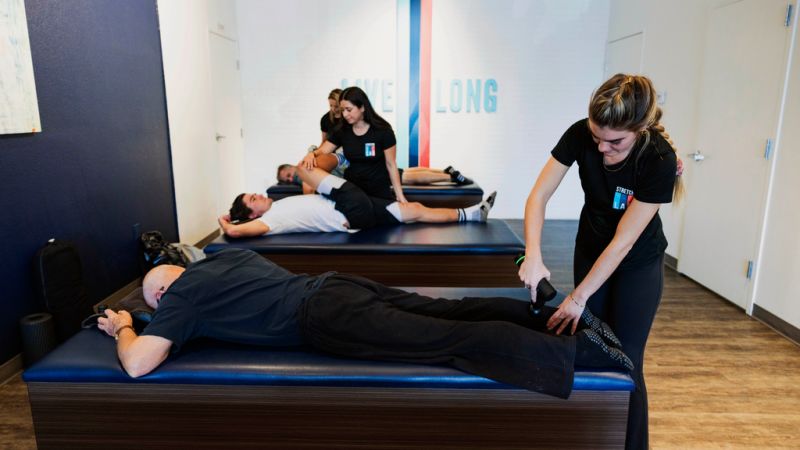Move over CrossFit, yoga and Peloton. Stretching sessions are the hot revival fitness fad.
Studios like StretchLab, Stretch Zone, Lymbr and Stretch’d are popping up in strip malls and street corners, offering tight and achy people one-on-one stretching sessions with “flexologists” and “stretch therapists” for $100 or more per appointment.
It’s not yoga, physical therapy or a massage — these sessions focus only on stretching. In a one-on-one session, an instructor will assist people with back, hamstring, shoulder and other stretches.
High-end gym chains such as Life Time and budget options like Planet Fitness are also trying to capitalize on the stretching trend, adding speciality stretching classes for small groups and devoting more space to stretching. Planet Fitness is adding dedicated stretching areas to its gyms for the first time.
Reservations to stretching classes at gyms increased 91% in 2023 from the year prior, according to data from ClassPass. StretchLab opened its 400th studio in November and has franchise agreements for 900 more studios.
Stretching is also making its way into the cultural zeitgeist. Larry David recently told Seth Myers he felt no difference after someone came to his home to stretch him out. The character Roman Roy in the TV show “Succession” has an awkward stretching encounter with his trainer.
Stretching studios and gyms make claims such as “perform better,” “eliminate chronic pain” and “relieve soreness.” But these claims are overblown, sports medicine doctors say.
In fact, there is little evidence that stretching prevents injuries. Some sports medicine doctors say functional and strength training and cardiovascular exercise offer wider benefits for most people than stretching.
Each of the stretching studios use their own stretching methods.
At StretchLab, for example, employees stretch out clients using “proprioceptive neuromuscular facilitation stretching” techniques, or “push and release” — resisting during the stretch and then releasing.
Studios also have different training requirements for instructors, who are often certified massage therapists, physical therapists, yoga instructors or have other backgrounds in health and fitness. StretchLab’s background-checked “flexologists” have to complete a 70-hour proprietary training program, which includes an in-person workshop.
Life Time has launched “Dynamic Stretch,” a one-on-one assisted stretching program with a “stretch specialist” certified by the company. Executives said on a recent conference call that they expect the program to hit $50 million in revenue this year. EOS Fitness, with more than 100 locations around the country, now offers group stretching classes and personalized stretch sessions.
Stretching has become more popular in recent years partly in response to the surge in weight lifting — particularly among women.
“People are more interested in weights now than they were years ago and less interested in cardio,” Planet Fitness CEO Craig Benson said recently. Planet Fitness and other gyms have scaled back treadmills and elliptical machines in gyms to create more room for weight training and stretching areas.
Other workouts such as Pilates and barre have also become more popular. Some see stretching as complementary to these types of classes.
“We’re seeing it across the board,” said Sarah Luna, the president of Xponential Fitness, which owns StretchLab and boutique brands like ClubPilates and Pure Barre. “We see all ages from young athletes to elderly to those that are trying to improve their golf game or swimming.”
Stretching can help people increase flexibility and range of motion. But stretching is not a panacea for preventing injuries or helping people improve their overall health, doctors say.
For people who are injured, stretching could make things worse.
“There isn’t strong evidence that prescribing stretching as an isolated treatment is going to prevent injury or optimize recovery,” said Dr. Adam Tenforde, an assistant professor of physical medicine and rehabilitation at Harvard Medical School and medical director of the Spaulding National Running Center.
“If people are spending 25 to 50 minutes for paid stretching, they may not be achieving the same health benefits if they focused on aerobic or high interval training,” he said.
And even for people who feel they have a lack of flexibility, stretching does not address the root cause of their pain or stiffness. It’s likely a sign of muscle weakness or another impairment and should be seen by a physical therapist or qualified health care provider, he said.
Instead of spending time and money on a stretching class, most people would be better served going for a brisk walk or some other moderate physical activity.
“I would much rather see people work on strengthening than stretching,” said Dr. Jesse Charnoff, a physiatrist at Hospital for Special Surgery in New York. “If you put that same amount of time and energy into walking, cardio exercise and strengthening, you’d probably have more benefits.”
Editor’s note: Sign up for CNN’s Fitness, But Better newsletter series. Our seven-part guide will help you ease into a healthy routine, backed by experts.
Read the full article here



